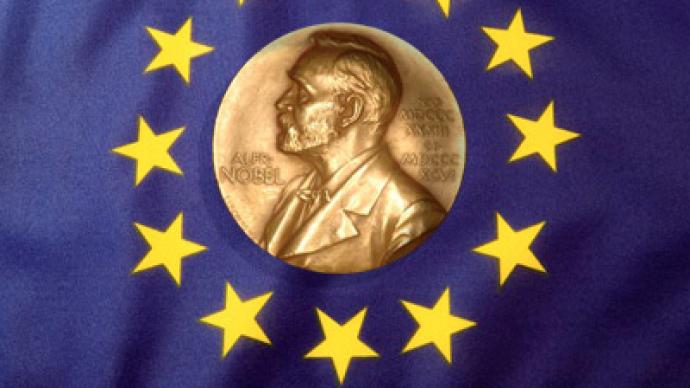The European Union was announced the winner of the Nobel Peace Prize 2012. A heated debate emerged over the validity of the award amidst the backdrop of Europe’s as-yet-unsolved economic crisis.
The 27-nation organization was awarded the prize for its role in “uniting the continent,” and its contributions “to the advancement of peace and reconciliation, democracy and human rights in Europe.”The unanimous decision was made by a five-person panel chaired by Thorbjoern Jagland, the Council of Europe’s Secretary-General and a strong advocate of the EU in Norway. “The EU helped transform Europe from a continent of war to a continent of peace,” Jagland said.The EU will receive a $1.2 million award on December 10 by the Nobel Committee.The news came 60 years after the creation of the EU’s predecessor organization, the European Coal and Steel Community, which helped rebuild a continent decimated by two World Wars."The European Union is in the middle of one of its worst crises, but perhaps it is precisely now the peace and stabilization project deserves a hand from the 'no' country Norway?" Norwegian public broadcaster NRK said.Norway, the Nobel Peace Prize’s host nation, refused membership in the EU in 1972 and again in 1994.The last organization to be granted a Nobel Peace Prize was French charity Medecins Sans Frontieres (Doctors Without Borders), 13 years ago.
Storm of debate erupts over EU peace prize win
The EU enthusiastically welcomed the announcement, with German Chancellor Angela Merkel calling the decision “wonderful,” and vowing to press for closer integration in the EU. "The fact that the Nobel Committee has honored this idea is both a spur and an obligation, also for me in a very personal way," she told reporters.Martin Schulz, president of the EU Parliament said he was “deeply touched and honored” by the prize. “The EU is a unique project that replaced war with peace, hate with solidarity.”“Overwhelming emotion for awarding of Nobel Prize to EU,” he wrote on his twitter account.The news also sparked debate and criticism in the EU and elsewhere. Nigel Farage, head of Britain's euro-skeptic UK Independence Party said the move was “an absolute disgrace. I think it brings the Nobel Prize into total disrepute,” the AP reported.The leader of Norway’s main anti-EU organization, Heming Olaussen, described the prize as “absurd” in an interview with NRK.RT’s Max Keiser expressed outrage, describing the Nobel Peace Prize as being given to “a technocratic monstrosity.”“This is like giving the prize to Frankenstein for being the best monster created during the past 12 months,” Keiser said. “Who are they going to give it to next? They are going to give it to a genetically modified seed in India where farmers are killing themselves by the thousands because of companies like Monsanto. Give it to Monsanto next year, Nobel Committee!”International investor and author James Rogers told RT that the EU may have gotten the prize for bringing nations together, but could still fall apart.“I assure you, next week or next month, when people are out rioting in the streets again in parts of Europe, they are not going to care about the Nobel Peace Prize,” Rogers said. “Europe has been spending money they don’t have. That’s going to have to stop, and it’s going to cause more riots in the streets, more social unrest, more governments failing and perhaps even countries failing, and perhaps even people pulling out of the euro.”Several Russian officials and human rights activists also expressed confusion over the decision.In 2009, the Nobel Committee raised eyebrows and sparked similar debate for awarding the Peace Prize to newly inaugurated US President Barack Obama. President Obama had only been in office for two weeks, but was awarded the prize “for his extraordinary efforts to strengthen international diplomacy and cooperation between peoples.”This is not to mention controversial 1973 Peace Prize for Henry Kissinger, US Secretary of State and US National Security Advisor, who was implicated in war crimes in Latin America and Southeastern Asia.

